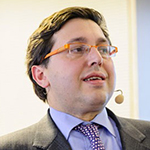Webinaire : Partenariats public-privé pour des solutions de villes vertes
MARDI 20 JUILLET 2021 de 16h00-17h00 CET
En coopération avec la Division de la Gouvernance démocratique du Conseil de l'Europe
Au lendemain de la pandémie de Covid-19, les gouvernements et le secteur privé cherchent à "reconstruire en mieux" et à assurer une relance verte, conformément aux engagements et obligations internationaux. Dans le même temps, ils doivent relever le double défi de la lutte contre le changement climatique et de la résolution des problèmes sociaux et économiques aggravés par la pandémie. Ce défi est particulièrement ressenti au niveau local.
Actuellement, les zones urbaines consomment plus des deux tiers de l'énergie mondiale et génèrent environ 70 % de ses émissions de gaz à effet de serre. On prévoit que d'ici 2050, plus de la moitié de la population mondiale vivra dans les villes. C'est pourquoi, dans les années à venir, les villes joueront un rôle clé dans la lutte contre le changement climatique. Pour contribuer à la transition vers une économie à faible émission de carbone et résiliente au changement climatique, les villes doivent investir dans des infrastructures à potentiel écologique, notamment dans les secteurs de l'énergie, du bâtiment, des transports et des déchets, pour n'en citer que quelques-uns.
Comment, dès lors, réaliser cette transition ? Quel rôle le secteur privé peut-il jouer ? Et quel est l'impact des partenariats public-privé (PPP) sur les solutions d’une ville verte ? En outre, quelles sont les stratégies de financement vert que les villes pourraient suivre et comment assurer la durabilité, la participation et la transparence ?
Le webinaire "Partenariats public-privé pour des solutions de villes vertes" explorera les différentes approches adoptées par les villes pour atteindre les objectifs climatiques, discutera des défis et des avantages associés aux partenariats public-privé, soulignera le rôle des stratégies innovantes de financement vert et identifiera les moyens d'accroître la transparence, la participation civile et la réactivité.
- Environment and the private sector (anglais seulement - news publiée par la Division de la Gouvernance démocratique du Conseil de l'Europe)

Benoit CATHALA
European mission manager at the French National Centre for Local Civil Service (CNFPT)

Benoit Cathala is the European mission manager at the French National Centre for Local Civil Service (CNFPT), in charge of coordination of trainings on European and international affairs, and international networks and partnerships. Previously cooperation attaché in Egypt and technical expert in Yemen for the French ministry of foreign affairs, he is an environmental engineer (specialised in water management) and has a bachelor’s degree in geography and socio-economic development. Trilingual (French, English, Spanish) and with a good knowledge of Arabic, his areas of expertise include public administration and governance, European and international affairs, development aid and project management, sustainable development, rural development, and training.

Julie EVAIN
Project Manager Finance, Institute for Climate Economics (TBC)

Julie Evain works as a research fellow in the Finance, Investment and Climate Division on climate risks analysis topics for financial players. She also follows more broadly the issues related with green and sustainable finance and financial regulation. Graduate of a Master’s degree in International Affairs and Environmental Policy at Sciences Po, she previously worked at the French National Assembly, at a consulting firm and at the French Ministry of the Environment, where she was co-rapporteur of the report ‘French strategy of green finance.

Juan Manuel REVUELTA
Director General, Finnova Foundation

Juan Revuelta was President of the European Regions Research and Innovation Network (ERRIN) between 2009 and 2011 and since 2010 he has been Director General of the Finnova Foundation (financing innovation in the regions). Finnova represents and defends legitimate public and private interests related to funding and innovation before the EU. Currently, Finnova manages the largest Interreg project in terms of volume (€24.5M), in the field of forest management, climate change and innovation in firefighting and prevention. Juan created the first Department of Innovation in the City Council of Valencia, achieving the positioning of the city of Valencia as a leader in Europe in the LIFE Environment in Circular Economy programmes. He was Director General of the Valencian Government in Brussels for 8 years. He has a degree in Business Law from the University of Valencia and Master in Tourism Management from IE Business School. He also completed the IESE Public Management Leadership Programme.

Ijeoma OKEREKE
Premium Times Centre for Investigative Journalism (PTCIJ), Nigeria

My work in the past 3 years has been committed to grassroots advancement and mobilizing citizens for action, an important trait found in great reformers today. A major part of my daily task revolves around mobilizing citizens to take up the responsibility of holding their leaders to account while engaging representatives of the government at both federal and state levels to execute budgeted projects. As a communicationist, I seek to understand the relationship between the media, democracy and the environment and that is why I am particularly interested in the World Forum for Democracy, a community of young people who are standing up for their rights and the environment.
